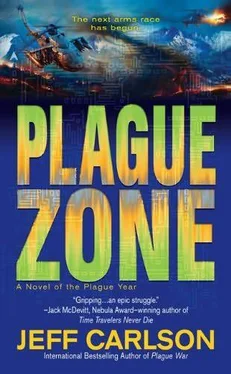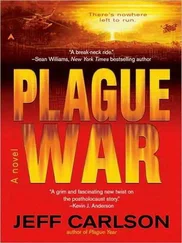Ruth had even briefly convinced Deborah to help, her crazy goddamned genius shining in her eyes like holy fire, although Deborah’s feelings had changed as soon as Ruth left her alone. Holding a vial of the parasite in her bare hand, waiting for Ruth’s signal to open the plastic tube, Deborah’s heart had soured at the idea of murdering thousands of Americans even if it meant saving millions more. Instead, she’d turned herself in along with the nanotech.
Deborah wasn’t proud of being tempted. She had just been very, very tired and hurt and afraid. Nor had she lied to the National Security teams who debriefed her afterward. She was considered a loyalist because of it, which was embarrassing and wrong. That was why she was still in Grand Lake. Deborah was one of the “lucky” people who were hardy enough to survive at this elevation, even if she had sinus trouble, so she’d accepted one of the key personnel slots in Complex 1.
She’d cut her blond hair for the same reason — to make herself a better fit. Deborah was no longer a civilian serving in the Army. She was Army.
They carried on a vital peacekeeping mission. Even with the many flaws, the superstructures beneath these mountaintops were a feat of engineering and difficult to replicate. U.S. Command not only needed as many existing bases as possible, they’d always kept one eye toward surviving another plague. The landing strips on the surface were small and congested, but the fuel depot was well protected, and this place had all the advantages of high altitude and geographical isolation.
Grand Lake Air Force Base was a powerful component of the deterrents arrayed against the Chinese and the Russians, not only because of its aircraft but because it served as an Alternate NORTHCOM. Complex 1 housed one of the early warning hubs for NORAD, the organization dedicated to monitoring the world for nuclear launches or initiating a U.S. first strike. They had the eyes, ears, and authority to coordinate with the missile silos in Wyoming and Montana — but even if they achieved 100 percent containment, sealing themselves off from the nanotech, Deborah knew their clean air would only last forty-eight hours.
There was still one final choice to make.
“Hold it.” Two men in containment suits stood in the next short hallway, blocking Deborah’s path. One of them held a submachine gun. The other carried a pistol and a walkie-talkie. Neither weapon was pointed directly at her, but the message was clear. These men were a quarantine point.
Mendelson and three others stood to the side, waiting nervously. “This isn’t right,” Mendelson said.
Cables lined the bare ceiling behind two fluorescent lights. Deborah’s boots scuffed on a rough patch where the concrete had fractured, been repaired, and cracked again. The entire hall had a slight sideways tilt. The air was rank with mold. Originally, these complexes had been sterile places, but there was some moisture leaking through the patch in the floor, and bacteria grew swiftly in the light and heat necessary to make the warrens habitable.
Behind her, the acetylene welder hissed. Its blue light flickered as more of her troops filed in behind her, craning their necks and bumping against each other. Emma said, “Why are we—?”
“Move over there,” said the man with the pistol.
It was exactly how Deborah would have organized things herself. Welding the doors wasn’t enough. The engineers also needed to be sure that everyone on this side was clean before they were allowed any farther.
What if they weren’t? That frightened her, but she covered the feeling with a brisk, impersonal thought. We did our job. Deborah holstered her pistol and swiped at her cheeks, embarrassed by the wetness on her face. “We’ll be okay,” she told her people, trying to help the men in the containment suits. It was important to keep everyone calm.
“You’re Reece,” the first man said suddenly.
Deborah nodded. “Yes, sir,” she said, not knowing his rank. She couldn’t even meet his gaze through the Plexiglas eyepieces in his hood.
“Good.” The man lifted his walkie-talkie and spoke loudly. It was a clumsy system, but his suit radio must not have been hooked into base communications. “We have Major Reece,” he said. “She looks okay.”
“Roger that,” the ‘talkie crackled.
What was happening?
“They think we’re infected,” Mendelson said.
“They just have to be sure,” Deborah said. “That’s all. We’ll be okay.”
She was ready to sacrifice herself if necessary. She had always been ready. There was honor in dying for the greater good, and the past two and a half years had only reinforced that belief in her.
“They need all the help they can get, and they’ll want these files,” she said, gesturing at the laptops and paperwork in their arms. The command center was too small for the hundreds of staffers necessary to receive and analyze NORTHCOM’s data streams, so they worked elsewhere in the warrens. Most of their information was regularly e-mailed inside, but they’d learned redundancy above all things. Paper files could be read even if a virus crashed the system.
The welder shut off. Boot steps sounded in the other hallway and Deborah flinched. Her self-control was eroding. What if the nanotech had sifted through the door before the engineers finished their seal? The plague wouldn’t affect those men, but they might be carrying traces of it on their suits. If so, as they walked into this hall, it would jump through Deborah’s people like wildfire…
One of the Navy officers spoke up. He must have been thinking the same thing, and he wanted to be sure the engineers knew what he was carrying. “I have three years of NSA intercepts on the Chinese LOGSTATs,” he said.
“I’ve got our SATCOM codes,” another man said.
“We’ll be fine,” Deborah told them.
“You’re bleeding,” Emma said, reaching for her, but she stopped short of taking Deborah’s arm, which filled Deborah with regret. They’d learned that touching each other was dangerous.
The engineers pushed into the crowded hall. Deborah heard them talking on their suit radios as they filed past, bearing their M4s and welding gear. “—get started,” the first man said, muffled.
Seconds passed.
No one was infected.
The last engineer through the door closed it behind him and the tension went out of the hallway.
“You must have hurt yourself when you fell,” Emma said, taking Deborah’s elbow at last. They both welcomed the distraction. Emma’s hands were skilled and light, gently investigating the bloody tear in Deborah’s sleeve.
Her forearm was scraped in two places. Strange. She hadn’t felt it. Deborah even smiled at the absurdity of a few cuts. It made her think of Band-Aids and her mother and a song Mom had sung when she was small and hurt herself, something about “oh green grow the rushes, oh.”
Emma smiled, too, not understanding but needing the human contact. Then their quiet moment was over.
“What are you doing!?” Mendelson yelled.
The engineers pulled at Deborah’s troops, herding them in the direction of the command center. “Down the hall! Down the hall!” one man shouted. They looked like they were preparing to burn the next door, but Deborah realized they were also disarming her soldiers.
“No!” she cried.
“Stay where you are,” said an engineer with a Beretta.
“Major Reece,” said another man. “You’re with me.”
“What?”
“Let’s go. They need you inside.”
“Inside the command center? What about the rest of my team!? These people are fine. You can see everyone’s fine!”
“They’ll be safe here.”
“That’s idiotic,” Deborah said coldly. “If there’s any risk of infection, I have it, too! You’ll be taking the same risk when you let me in!”
Читать дальше












